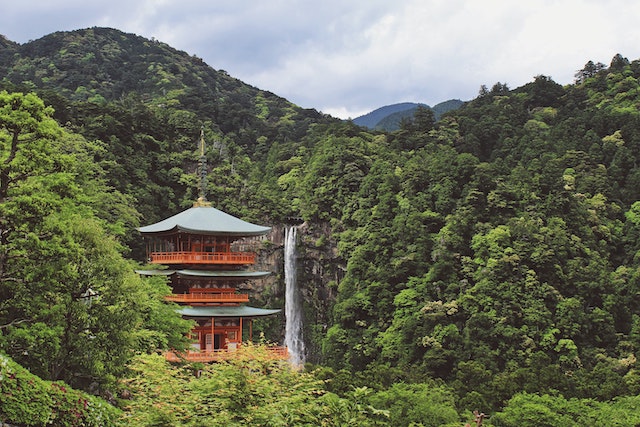Pregnancy in Japan: The Real Deal with Monica Salazar

What’s it like to experience pregnancy in Japan as a future single mom? Monica Salazar shares the highlights and the challenges.
Tell us about yourself! What do you do when you’re not traveling the world? Where are you from? Where do you currently live?
I’m from Ecuador and currently living in my country. Now I travel both for business, family and pleasure, trying to combine them during most trips.
I’m an International Money Relationship expert, coaching entrepreneurs and global consultants to understand their relationship with money, and confidently expand to new territories in their business and life. I specialize in money conversations for business expansion when there’s a multicultural or feminine aspect in the background of the business owner, employees or audience.
I’ve been working with Hispanic people around the world but just recently decided to expand to the English-speaking community, to be able to reach people from more diverse cultural backgrounds. My Spanish website is Dinero Femenino and my English website is Feminine Money.
What made you decide to move abroad? How long did you live there for? Tell us about how you spent your time in your new destination — whether you worked, studied, traveled, or did something else.
When I was in college in Ecuador, I came across a little announcement about full Japanese Government scholarships and decided to apply. I ended up being awarded one of the two full scholarships offered, and just followed the steps until I found myself in Japan.
I lived in Japan for three years. I spent the first year learning Japanese full time, to be able to go from zero to an acceptable level to join the master’s course. During the first year, I basically studied most of the time, but also had lots of interaction with international students from all over the world. During the second and third year, I joined the master’s program, so I continued to study, but I also interacted with Japanese students and professors.
What were some of the biggest challenges you experienced while living abroad? What were some of the greatest highlights?
At the beginning of the second year, when I had just started the Master’s program, I got pregnant in a totally unexpected setting. So I became a single mother, foreigner, and student in a culture where pregnancy during your educational path is regarded as extremely irresponsible, but where abortion is widely accepted. During my early pregnancy, the most common question that Japanese friends asked was, “Are you going to let the child be born?”
However, most shocking for me was having doctors advise me to have an abortion, as I approached them to help me manage a pre-existing health condition. I reached out to different doctors and even went to a big hospital where I would be able receive assistance in English. It was there that I had an intense conversation with a doctor who thought that my only option was to abort the child because “I was young, I could have more children in the future, and I had a good scholarship.”
As soon as I realized I was pregnant, I decided to start bold conversations with my circle in order to find out what my options were. This was a good move because I found support (except in the health system), even when the issue was extremely uncomfortable for everyone.
Pregnancy in Japan: The Real Deal with Monica Salazar.
My professor didn’t judge my situation but only expressed his support and told me that as long as I did my academic work, took the classes and submitted my thesis on time, I would be able to graduate.
I started attending a Christian church where “single motherhood” was also a very uncomfortable topic. They just didn’t know how to handle the situation, and told me that I was like the second single mom in the history of the church! The church became my family, I got baptized with my seven-month belly, and three of my church friends were with me during my labor.
So the highlights were definitely seeing how people overcame their cultural barriers and traditions in order to express their love and support for me. I also felt that even if the Japanese felt uncomfortable, they appreciated my honesty and transparency from the beginning, and my effort to complete all of my academic assignments despite pregnancy and later, motherhood.
What do you wish you knew before you moved?
I wish I would’ve reached that age with more self worth so that I could’ve made better decisions. I do acknowledge my failures, however, I appreciate the story as it is, because all of it led me to where I am now.
I also wish I would’ve known about child birth practices in Japan. Later, I realized that the people willing to have a natural experience choose home birth (very popular in Japan). I thought I would’ve had breastfeeding and co-sleeping support in the hospital, but it was just the opposite. However, I’ve found that this is not a Japan-only problem, but rather a worldwide problem.
At the end of the day, it was good to be a foreigner, because people thought that my childcare ideas came from my culture. I breastfed my son exclusively for almost a year, raised him diaper-free, and never put him in a stroller, as I carried him in a baby sling. If I had tempted to practice this in my own country, I would’ve been seen as inappropriate. In Japan, the people surrendered to the fact that I was a strange foreigner. For example, nursing a baby in the university library was seen as totally crazy, yet people were so astonished that they never even commented.
Old Japanese people loved that I carried and breastfed my baby, and thought it was fantastic that I would hold my son over the toilet instead of making him go in a diaper.
Any favorite restaurants/events/sites that you’d like to recommend? Tell us what made them great!
Favorite restaurant: A family restaurant three blocks from my house in Saitama. It opened during my pregnancy, sold fantastic traditional home-style food, and was a life saver during those days when I couldn’t cook. The staff loved my child and would give me another plate “for him,” even when he was exclusively breastfed. Japanese kindness is great!
I loved camping in Okinawa. The people in the rural area of the island are so kind and caring. When we were about to sleep, we saw a light and feared someone was approaching. It was the guy from a restaurant we had lunch in earlier, bringing a torch to lend us, as well as delicious homemade food as gifts!
Are there any tips you’d give someone else considering a similar move?
I love being in environments where I’m “the only different person,” but if you don’t like to feel isolated, or if you feel resentful when you’re not integrated, then you’ll probably resent it that the Japanese won’t fully allow you to be part of their culture.
I have yet to see a foreigner fully integrate into Japanese society. The culture is so strong that even if they invite you into their homes, laugh with you, and are kind to you, you’ll probably never feel like one of them.
Is there anything that women specifically should know before they move to your destination?
There’s little chivalry. I was surprised when a guy on the train argued with me when I respectfully asked him to stand up from his seat, as I was seven months pregnant. Also, if I was standing at the station with my baby in my sling, and a guy with a cigarette approached, I’d be expected to move–even if it was raining outside. These types of norms may not make sense to you as a woman.
If you’re thinking about studying in Japan, be aware that the language is very hard to master. My foreign friends and I reached a point where we thought we wouldn’t be able to continue because the language was too hard, we couldn’t understand, and we felt isolated and left behind. Feeling like you’re not good enough is always your worst enemy.
Pregnancy in Japan: The Real Deal with Monica Salazar photo credit by Unsplash.









What a pleasant surprise to find this interview was published!! I’m looking forward to learn how other women have coped with pregnancy and motherhood in multicultural environments! Please leave your comments 🙂